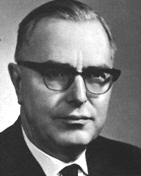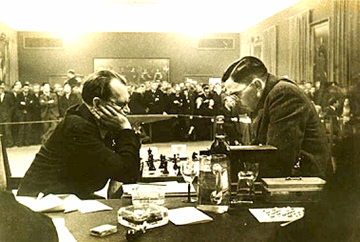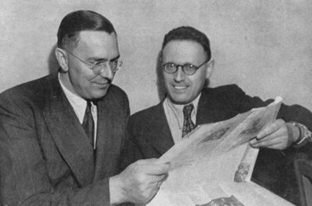Euwe Dr. Max (20.05.1901 – 26.11.1981)

Dutch Grandmaster, the 5th World Champion, the 4th FIDE President.
Euwe won 13 times the Dutch championship, he played for Holland in seven Olympiads (1927-62); played nearly forty matches beating Rudolf Spielmann, Efim Bogoljubow and Jose Raul Capablanca.
Dr. Euwe’s great success in this sport and wide activity in literature have contributed a lot to the popularity that chess has today in Holland and the position that this country occupies in International Chess. It is interesting that Grand Master Max Euwe in his whole essence has a lot in common with the world champion Botvinnik. Hans Kmoch called Euwe “the Genius of Order” when he met him for the first time. The fact that in the year of 1935 he reached the highest point in the world of chess is mainly to mention when talking about some of his games and his entire career as well. The Genius of the Order of brilliant chess strategies celebrated at that time his victory over the Bohemia Genius chess artist.
Dr. Max Euwe was born on May 20, 1901 in Watergrafsmare near Amsterdam. When he was ten years old he participated in the open tournaments and won three games in the four round tournaments. Then he became the member of the chess club where he started studying the theory establishing his first problems regarding the game of chess. His professional career began right after the First World War. In the year of 1919, he took the 2nd and the 3rd place in the Dutch Championship. A year later, he played with such outstanding Grandmasters as Geza Maroczy, Savielly Tartakower and Richard Reti, then he participated in one small tournament against mentioned above players and after in the struggle of four rounds. In a number of some smaller tournaments, Euwe proved his great talent. In 1921, he played against Alexander Alekhine in a very important tournament in Budapest. Alexander Alekhine won the first prize and Euwe finished sixth just before such Masters as for instance Efim Bogoljubow. His first great achievement was Maerisch –Ostrau 1923. Euwe was at the 5th-6th place, then Emanuel Lasker, Richard Reti, Ernst Gruenfeld, Alexey Selesnjew, together with Savielly Tartakower, but after Efim Bogoljubow, Akiba Rubinstein, Rudolf Spielmann, Siegbert Tarrasch and others. Euwe became a Master of a high international rank, whose opinion is taken into consideration in the entire chess world. In Hastings 1923-24 Euwe assigned to himself the first place over Geza Maroczy, Edgar Colle and Frederick Yates. In Wiesbaden in the year of 1925, he won Friedrich Saemisch and Rudolf Spielmann.  In the period from 1926 until 1932 he achieved, however not officially, but indisputable, the Grandmaster’s title. In the tournaments, he yielded to Alexander Alekhine, Efim Bogoljubow and Capablanca, overcame Rudolf Spielmann and Edgar Colle and played against Salo Flohr a bit indecisively. In 1928 he won the title of World Amateur during the Olympiad of 1928. In 1931 in Hastings he was the first before Jose Raul Capablanca. In Bern 1932, he took without defeat the 2-3rd place before Alexander Alekhine. It was mainly attentiveness that earned success in the tournaments of that period: an indecisive score against Alexander Alekhine 7:7. There was enough criticism that saw no appropriate Challenger for the Title of the World Champion. Just the opposite was when he took the 2nd-3rd place after Alexander Alekhine in the 1934 tournament in Zurich. Of course, more convincing was the result of the World Championship in 1935: Euwe won it with the score 15 ½ -14 ½ and kept the title for two years. It was a big surprise and the genius Alekhine had to admit the victory of the Dutch Grandmaster. Euwe won the World Champion title and chess was not everything he was doing in his life. At that time Euwe studied Mathematics very intensively being already the Doctor of Mathematics and worked as a Professor at a University. However, later after the World War I, the scientific work started displacing chess. The year of 1935 was the highest pick of Euwe’s chess career.
In the period from 1926 until 1932 he achieved, however not officially, but indisputable, the Grandmaster’s title. In the tournaments, he yielded to Alexander Alekhine, Efim Bogoljubow and Capablanca, overcame Rudolf Spielmann and Edgar Colle and played against Salo Flohr a bit indecisively. In 1928 he won the title of World Amateur during the Olympiad of 1928. In 1931 in Hastings he was the first before Jose Raul Capablanca. In Bern 1932, he took without defeat the 2-3rd place before Alexander Alekhine. It was mainly attentiveness that earned success in the tournaments of that period: an indecisive score against Alexander Alekhine 7:7. There was enough criticism that saw no appropriate Challenger for the Title of the World Champion. Just the opposite was when he took the 2nd-3rd place after Alexander Alekhine in the 1934 tournament in Zurich. Of course, more convincing was the result of the World Championship in 1935: Euwe won it with the score 15 ½ -14 ½ and kept the title for two years. It was a big surprise and the genius Alekhine had to admit the victory of the Dutch Grandmaster. Euwe won the World Champion title and chess was not everything he was doing in his life. At that time Euwe studied Mathematics very intensively being already the Doctor of Mathematics and worked as a Professor at a University. However, later after the World War I, the scientific work started displacing chess. The year of 1935 was the highest pick of Euwe’s chess career.
Euwe won the World Champion title but chess was not everything he was doing in his life. At that time, Euwe studied Mathematics very intensively being already the Doctor of Mathematics and worked as a Professor at a University. However, later after the World War I, the scientific work started displacing chess. The year of 1935 was the highest pick of Euwe’s chess career.
Being the World Champion and the ex-World Champion, he achieved many other great successes like the second place after Fine but before Keres, Savielly Tartakower, Efim Bogoljubow in Zandvoort in 1936.
During World War II, he did not take part in chess tournaments.  The representatives of the power that occupied Euwe’s homeland organised all the tournaments at that time; the Grandmaster did not participate in them and it was his silent, but meaningful protest against the invaders. A big tournament in Groningen 1946: an intense struggle between Euwe and Mikail Botwinnik. In the first round, Euwe was the second and as for the other 45-year-
The representatives of the power that occupied Euwe’s homeland organised all the tournaments at that time; the Grandmaster did not participate in them and it was his silent, but meaningful protest against the invaders. A big tournament in Groningen 1946: an intense struggle between Euwe and Mikail Botwinnik. In the first round, Euwe was the second and as for the other 45-year-
The big tournament of Groningen 1946 was an intense struggle between Euwe and Mikail Botwinnik. It was clear that Euwe was still belonging to the leading candidates for the World Champion title however, his scientific activity at the works on Mathematics started prevailing, and later in the last years, it entirely led him out of chess.
From 1970 until 1978, Dr. Euwe became FIDE President and had to spend a lot of energy to deal with critical chess problems like the match Robert Fischer-Boris Spassky, Fischer withdrawal and Anatoly Karpov’s title in 1975, the match Anatoly Karpov-Viktor Kortchnoi in 1978 and the Libyan anti-Olympiad of 1976.
During his presidency, Euwe travelled and promoted chess around the world especially visiting the Third World countries to explain to the head of states the educational benefits of our game.
Despite the active playing, Euwe acquired an extraordinary merit having created his literary work on the development of chess, which he started writing already in 1928.
We can say that Euwe’s works are the most important ones in the History of chess literature. Euwe was the only one who introduced systematic aspects in the chess literature, his books were written with the stress on the pedagogical review, which was the basis for all chess generations.



